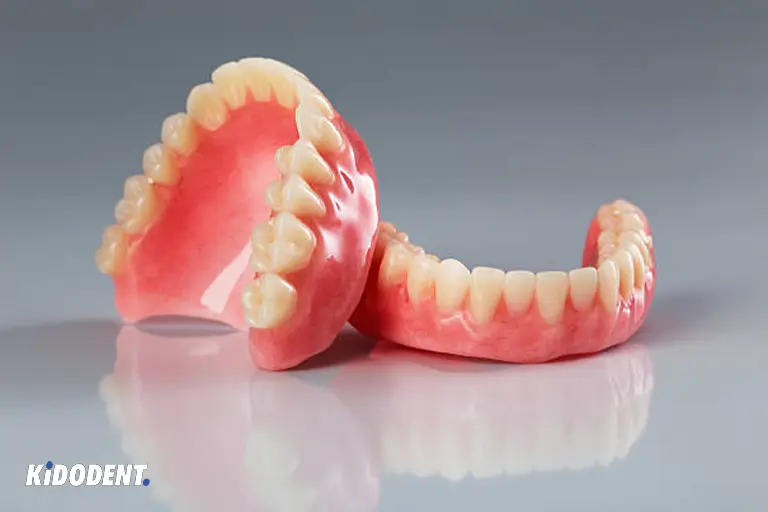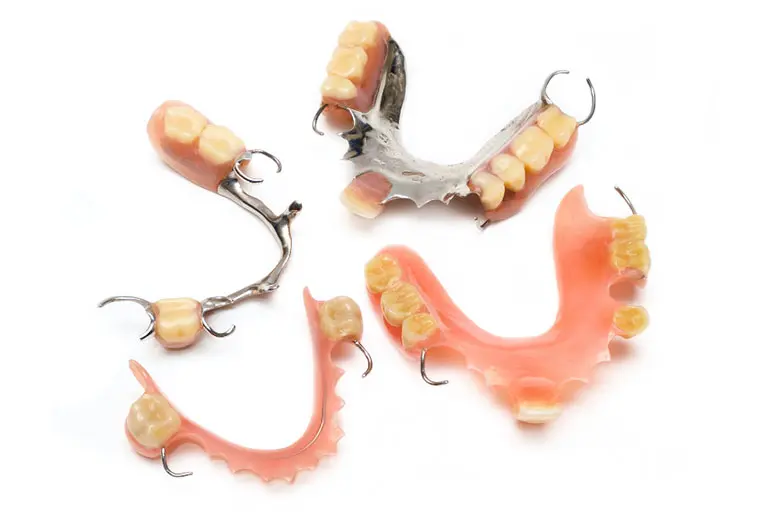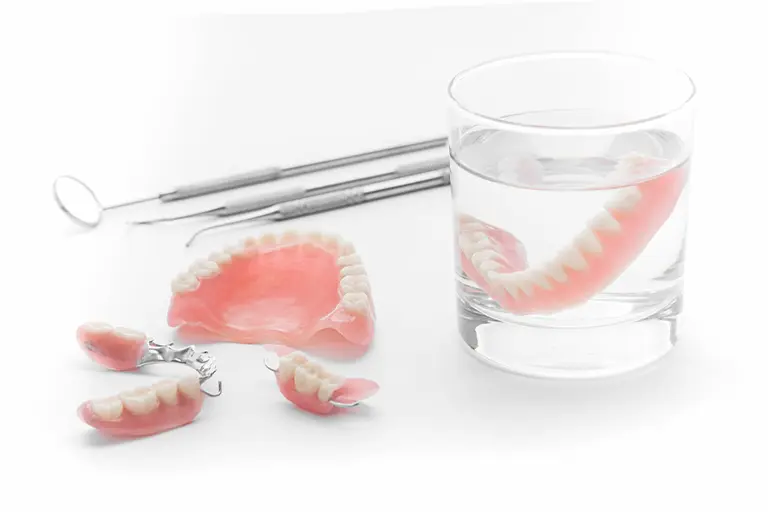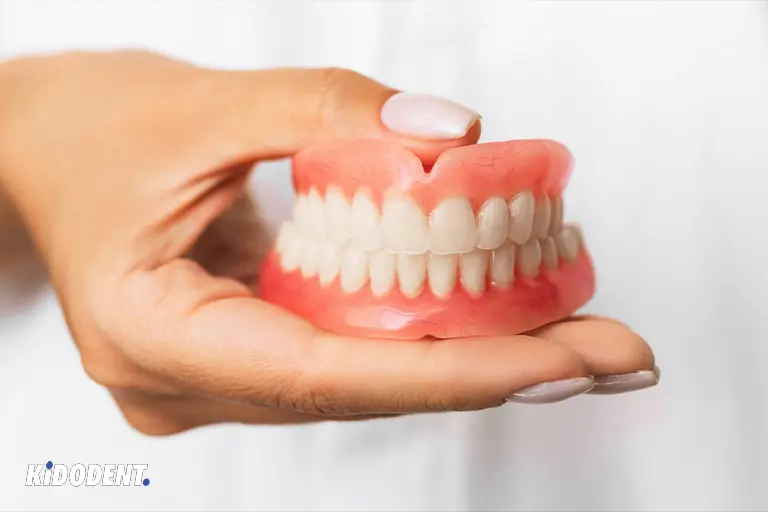What are dentures?
Dentures are removable false teeth that replace your missing teeth. You can get partial dentures when you have some of your natural teeth remaining. Or you can have complete dentures in case you have lost all of your teeth. Dentures can offer you a cosmetic look with all functions that a normal pair of teeth has.
You will have your regular chewing, eating, speaking and smiling with your dentures on. Whether you have lost some teeth or all teeth in your mouth due to gum diseases, injuries, tooth decay, aging or other tooth loss causes, you have various types of dentures that are great options to choose for treating your missing teeth. These oral appliances provide you with an attractive look for your face.
You may not be able to get dental implant because of low density, weak, or low quality bone that is necessary for an implant procedure. On the other hand, you may not be able to get dental bridges due to multiple missing teeth in your dental arch, which makes dental bridge a risk and a waste of money and time. So, you can select dentures as they have been used by the majority of people from every age group to replace missing teeth.
Who needs dentures?
Dentures are not just for the aging population. Young individuals who have large edentulous (empty) space caused by missing teeth are also good candidates for dentures. Denture wearing is necessary to socialize, save your teeth function, and move on to your daily normal activities. Dentures are suitable for:
- Anyone who has multiple or complete missing teeth
- The elderly. Our seniors when get to ages above 60 are most likely candidates for dentures. Around 90 percent of edentulous people (who have lost all teeth) wear dentures.
- Young children and persons who have lost their teeth due to accidents and injuries, diseases, and extreme forms of tooth decay
- When dental implant is not possible to do. As in young persons and people with weak and low bone quality
Types of dentures
There are different types of dentures including full, partial, and implant-supported types.
Complete (full) dentures

Suitable for people who have lost most of their teeth, complete dentures are made for either upper or lower teeth depending on whether you have complete tooth loss in just lower, upper, or both jaws. Full dentures consist of a plastic base that seats on your gums and a full range of false teeth on top.
The denture base has the same color of your gums and palate of your mouth. The false teeth on top of this base will function as your normal teeth for chewing, speaking, and other teeth activities. Your dentist needs to extract the remaining teeth to design and replace your full dentures.
Your gums and soft tissue areas of the extracted teeth should heal and then dentures are placed. During this time, you can wear immediate dentures that have been made as your temporary dentures until healing ends. It can take 2 to 3 months to recover from the extraction.
Partial dentures

Partial dentures are for those people that have lost several teeth and they have multiple natural teeth remaining in their mouth. Partials come in two types: removable partial dentures (RPD), which can be removed, and fixed partial dentures (FPD), which are fixed on your missing teeth area.
Partial dentures have also a gum-colored denture base and several false teeth on top of this base depending on the number of missing teeth. But unlike complete denture, which uses the bulkier base to hold and be fixed in place, partials use clasps or sometimes a metal framework to fit and firm in your mouth.
Implant-supported dentures (overdentures)
Implant supported dentures offer a stable and lifetime denture type. These are also known as overdenture. Dentists use multiple implants, which are screwed into your dental arch jaw bone to retain and support your dentures. Then they mount the false teeth on the abutments of the implants. Implant-supported dentures are an excellent option for denture wearers who are tired of refitting and relining, which are common problems for conventional denture types.
They preserve your bone and prevent more bone loss and this helps you have healthier bone quality for many years. However, not everyone can get implants to retain their dentures. If you have low bone quality and bone loss in your jaws, they can’t be an option for you.
How are dentures made?
Generally, you will need several appointments to get your custom-made dentures. A dentist or prosthodontist who specializes in dental restorations will be involved with lab technicians to make your oral appliance.
The main steps to make dentures include:
- Impressions are taken of your oral structures, gums, and jaw bones to find the best upper and lower occlusion for your teeth. Dentists will have access to high-tech scanning devices that will take impressions with more precision.
- Next, wax patterns and models are created in the lab based on the impressions taken. Your dentist will add artificial teeth and denture base with color of your gum to cover oral soft tissues. You will be able to choose the best shade and tooth color that matches your appearance or other remaining teeth (in case of partial denture).
- At the try-in appointment, you try your dentures to make sure they fit well in your mouth or if any adjustment is necessary to have a comfortable denture.
Finally, with all the needed adjustments and refitting process is done, your dentures are ready. Your dentist provides instructions and maybe asks you to visit within days or weeks to check your gums and the condition of other oral soft tissues
Cost of dentures and insurance coverage
The cost of complete dentures both upper and lower can range anywhere from $3,000 to $6,000 or even more because of tooth extraction costs. Partial dentures can cost you $500 to $2,500 and can vary because of material used in artificial teeth and location where placed (upper or lower jaws). Implant-supported dentures (overdentures) can cost between $4,000 and $8,000. But depending on the number of implants the prices will be different.
The prices of dentures depend on the types you choose from partial, complete or implant supported types. Insurance coverage for dentures also depends on the type and the policies of the dental insurance providers. It is possible that 50 percent of the total cost is covered by insurance.

Cleaning dentures and maintenance tips
Your dentures require cleaning and maintenance if you want better oral health. So, read on to know how you can keep them clean.
Use denture cleansers
To clean and disinfect your dentures, you can use denture cleansers that come in pastes, creams, gels, and solutions. At first, rinse the denture and remove any food debris. Then you can make a solution with warm water and the denture cleansers.
Finally, soak the denture in the solution for as long as the product’s label instructs you to do. By that, you prevent your denture from getting stained and you get rid of any bacteria and plaque buildup on the denture.
Use soap and other mild home products
If you don’t have access to denture cleansers, you can use soap or dishwashing liquids to clean your dentures. Use a soft bristle toothbrush to clean your appliance. Do not ever use abrasive toothpastes, household bleaches, and powdered forms of cleaning products as your home cleaning care for your dentures.
Use denture adhesives but not much
Denture adhesive or glue is available in powder, paste, and cream forms. People often use them when their dentures come loose or become uncomfortable in their mouth. Dentists usually prescribe adhesives for patients with xerostomia (dry mouth) due to the lack of saliva. With a dry mouth, there is no moisture in the mouth, so it causes dentures to be loose and ill-fit.
Denture adhesives are just a temporary way to refit and retain firmly your dentures in place. You should visit the dentist for adjustment and relining of your dentures. Use denture adhesive in a recommended size and frequency and read the instructions for each product. Do not overuse denture adhesive because of some ingredients like zinc, which too much of that can have harmful effects on your body.
Take good care of your dentures
When you are not wearing your dentures, put them in denture cleanser solutions or water. Do not carry them around or leave them where they can get broken.
Brush your teeth and clean your gums
You should remove plaque and food particles that are trapped between your dentures and the gums. Every morning rinse your mouth before placing the dentures and clean your gums regularly with a very soft bristle toothbrush. This will not only help you have healthier gums but make dentures a long-life companion.
If you are wearing partial dentures, remember to brush your other teeth daily. Clean both your teeth and all the parts of your oral appliance thoroughly to get rid of trapped foods and to prevent bacterial growth. If you are wearing complete dentures, with each removal and wearing, you can clean your mouth and gums and brush your dentures gently.
Frequently asked questions
Dentures can change your appearance more than you think. Because they look natural and made and developed from materials that look exactly like natural teeth, so you will be pleased if you know how your face has changed by wearing dentures. They improve both your smile and your look.
Wearing dentures is a great way to have a younger appearance because it helps retain and hold your facial muscles, preventing face sagging.
At first, you may feel some uncomfortable feelings about eating, but you will get used to your dentures. To decrease and prevent discomfort, try soft foods at the beginning and cut the foods and fruits into smaller pieces. Why? Because you are new to wearing dentures and you may bite hard into foods and fruits, which may cause pain to your gums and even hurt your tongue unintentionally.
During the first few days and weeks, your dentist may ask you to wear the dentures all the time. Your dentist can refit and readjust the dentures for better mouth harmony if it causes you discomfort.
When you go to sleep, you should remove your dentures to give your gums and soft tissues of your mouth a rest. Removing them will increase saliva stimulation, which gives you more chance for self-cleansing and cleaning of your mouth.

2 Comments
I’m 15 and haven’t had my first kiss. And i wear dentures at my top teeth because i lost it due to an accident happened this year. I have questions. -Will my dentures fall out if i kiss someone? -can they be able to tell? pls answer and thank you
Oh sweetheart. I got mine early too. Make sure they’re secure in your mouth, not loose or wiggly and they shouldn’t fall out. (If they don’t fall out eating, they won’t fall out kissing) They shouldn’t be able to tell unless they lick the roof of your mouth, which would be weird. Lol. I have kissed many people, many people, and none have been able to tell unless I told them. And make sure that when you do decide to have your first kiss, that it is with someone kind enough that if they do notice or find out that they will be kind and sensitive.